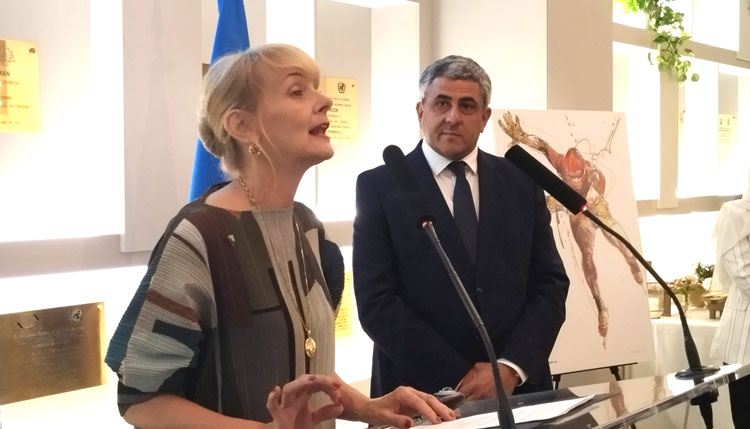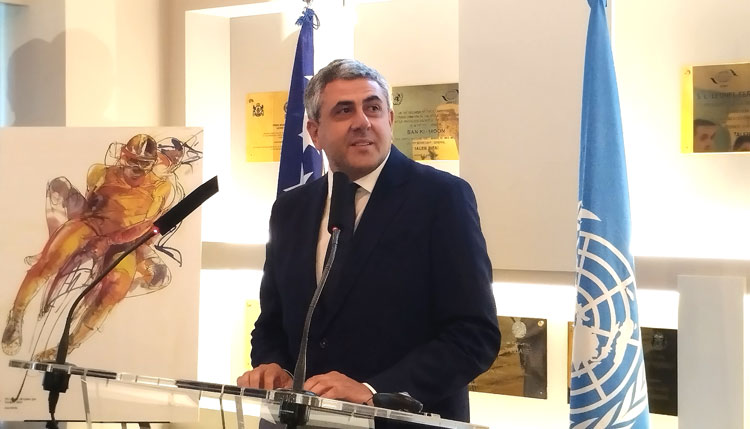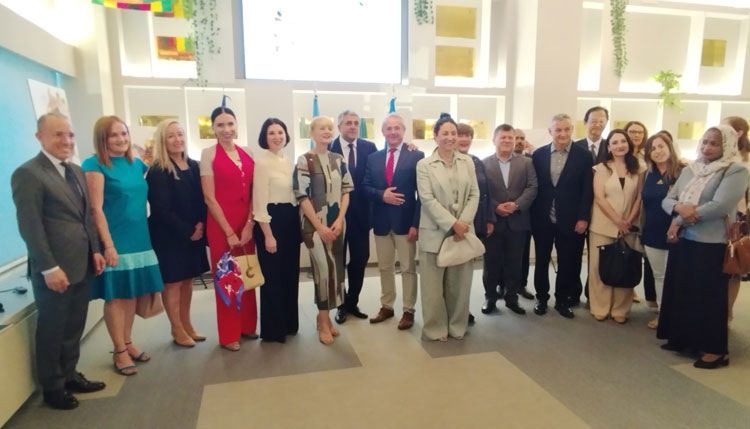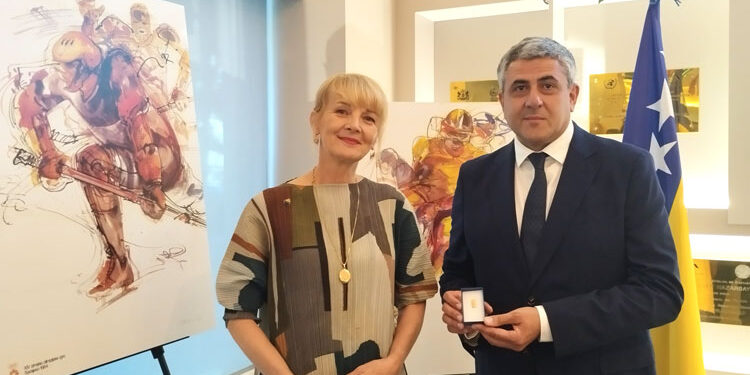Vesna Andree Zaimovic, ambassador of Bosnia and Herzegovina, presented last Tuesday at the UN Tourism delegation in Madrid the exhibition The Olympic spirit unites the world, with the award-winning posters drawn by Ismar Mujezinović.
The event was welcomed by UN Tourism Secretary-General Zurab Pololikashvili, who said: “Today we see that tourism sports are moving tourism and have a big impact on it. So sport moves a large number of tourists all over the world.”
Referring to the works displayed in the exhibition, Zurab Pololikashvili commented that “today, we have another third component (next to sport and tourism), which is art. And we have beautiful pieces of art surrounded by their names. They are as difficult as mine. I’m very happy to have this kind of initiative”.
The UN Tourism Secretary General recalled the 1992 Barcelona Olympics, “a very, very clear example,” he said, “of how the Olympic Games can change the city. Barcelona was totally transformed and it was a huge, huge step. Now there is much more tourism in Barcelona”.
The ambassador of Bosnia and Herzegovina, Vesna Andree Zaimovic, then spoke, highlighting the importance that the Winter Olympic Games that took place in this country on the Balkan Peninsula between February 8 and 19 had for her country and for the Olympic spirit. 1984, which he described as “the best organized up to that time.”
“Many agree, noted Vesna Andree Zaimovic, that the main reason for this was the human factor, through enthusiasm, friendship, openness, solidarity shared by everyone: hosts and guests. It was proof that the spirit of Olympism can unite the world. It is believed that, in ancient Greece, during the Olympic Games the weapons were silent and there was a truce. Why couldn’t it be the same in our time? This year is an Olympic Year, we invite you to recover that spirit and call for peace.”
“The spirit of Olympism still lives in Sarajevo, the capital of Bosnia and Herzegovina, indicated the ambassador, which hosted the XIV Winter Olympic Games. Despite many trials, war, siege and extremist narratives that still threaten it today, that spirit is still present in my city and my country. This year, as we commemorate the fortieth anniversary of the Olympic Games in Sarajevo, we celebrate their steadfastness. “The Olympic Games accelerated the development of tourism and turned Sarajevo into a famous destination that, in addition to its rich history, also offers great opportunities for winter sports and adventure tourism.”
Ambassador Vesna Andree Zaimovic then referred to the posters drawn by Ismar Mujezinović, which won awards in Oslo, Vienna and Brussels, where the poster with the image of a speed skater was declared the best in 1984. “Each of them, He noted, “it reflects the specificity, attractiveness, dynamics and demands of winter Olympic sports, but looking at them together, as a cycle, we are faced with a unique and timeless work of art.”
Next, the Bosnian ambassador referred to the figure of Juan Antonio Samaranch, the then president of the International Olympic Committee, “a particularly very important person who gave enormous support” to the holding of those Olympic games. “He believed in the inhabitants of Sarajevo and was a faithful friend until the end of his life. In his honor, the Zetra Olympic Building was renovated after being bombed and burned during the siege of Sarajevo and was renamed Juan Antonio Samaranch.”
The Bosnian ambassador went on to describe the most specific aspects of the celebration of those Olympic Games and described them in this way: “Sarajevo was chosen as the host city for several reasons, among others that the sports fields were only 30 kilometers away. Sarajevo was also recognized as a landmark representing all peoples and citizens of the then state – the Socialist Federal Republic of Yugoslavia. Sarajevo, with its openness and tolerance, calmed the tension of the Cold War and 49 countries, 1,272 athletes, of which 274 were women, participated in the Olympic Games. For the needs of the Olympic Games, 160 objects were built with the best green practices of the time so as not to damage the natural environment. The city welcomed 15,000 official guests, including 2,000 journalists from 769 newsrooms around the world. At the same time, the city had approximately 50,000 tourists. 39 competitions were held in 6 sports and ten disciplines. The first medal at the Winter Olympics for the host country was won by Jure Franko.”
“It is estimated, the ambassador continued, that the television broadcast of the opening of the Olympic Games was watched by a record number of 2 billion people. The Slovenian Bojan Križaj took the solemn oath on behalf of all the athletes and the Croatian Sanda Dubravčić lit the Olympic flame. And everyone fell in love with the mascot of the games: the little wolf Vučko, who is still a favorite memory today.”
Ambassador Vesna Andree Zaimovic noted that “all social groups from all over the former Yugoslavia participated in the preparation and implementation of the event: athletes, artists, army, youth, children, retirees… All workers volunteered to donate 2% of their profits to contribute to the accelerated construction of infrastructure, among which my parents were also included.For me personally, as a teenager at the time, as well as for hundreds of other teenagers from Sarajevo, the Olympics were our first paid work experience. I worked as a hostess and translator on buses with foreign tourists from hotels to competition venues. This attractive job allowed me to see the events.”
To conclude the event, the ambassador symbolically expressed her gratitude to the Secretary General of UN Tourism, Zurab Pololikashvili, for his hospitality, and presented him with the original commemorative badge with the emblem of the XIV Olympic Games, and thanked him and his team “for their help in promoting the tourism potential of my country, Bosnia and Herzegovina.” The event was attended by the ambassadors of Bulgaria, Turkey, Serbia, Hungary, Slovenia, Uzbekistan, New Zealand, Jordan and Japan, as well as representatives of the delegations of Albania, Switzerland, Croatia, Bangladesh, Georgia, Sudan and Montenegro, among others.










